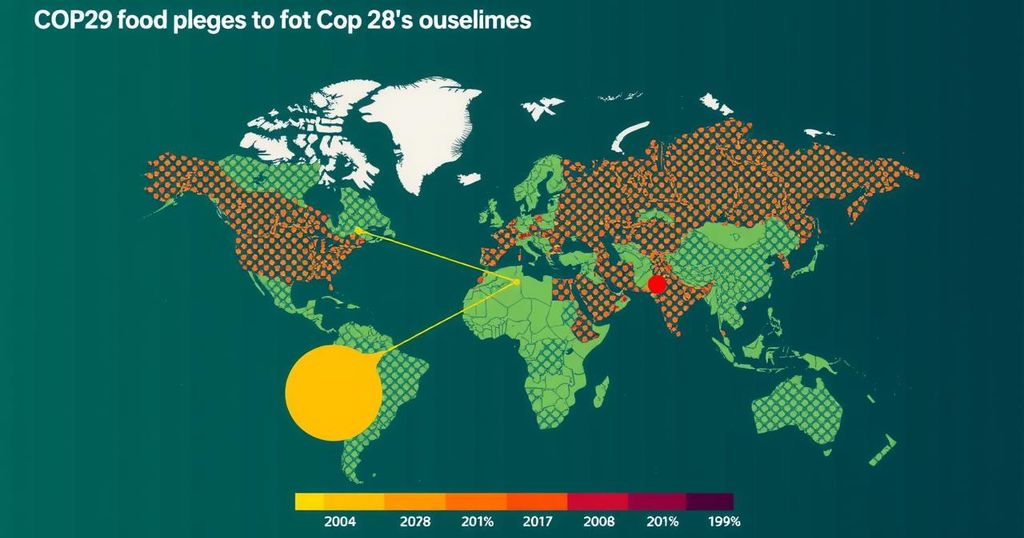Climate change
ASIA, AZERBAIJAN, BAKU, BELÉM, BELEM, BRAZIL, CLIMATE CHANGE, CLIMATE JUSTICE, DAVE, DAVEY, EDWARD DAVEY, ENVIRONMENTAL POLICY, EUROPE, FOOD AND LAND USE COALITION, FOOD SECURITY, PARIS AGREEMENT, SENTIENT, SOUTH AMERICA, THE FOOD AND LAND USE COALITION, UAE, UK, UNITED KINGDOM, WORLD RESOURCES INSTITUTE, WRI
Fatima Khan
0 Comments
COP29 Food Pledges: A Critical Examination of Progress and Challenges Ahead
World leaders at COP29 in Baku focus on food system reforms pledged at COP28, where over 100 nations committed to addressing greenhouse gas emissions from agriculture. Significant barriers to progress persist, with only 40 nations likely to update their climate plans. The debate on dietary changes is crucial for Global North countries, while both public and private sectors strive for transformation amid critiques of UN strategies and delays in the food systems roadmap.
As world leaders convene in Baku, Azerbaijan for COP29, the spotlight remains on the commitments made to reform food systems resulting from last year’s COP28. This past conference marked a pivotal moment as it was the first focus on greenhouse gas emissions from food. Over 100 nations endorsed a declaration pledging to adjust their food policies by 2025. Despite the urgency highlighted by researchers regarding the need for substantial changes in food systems, tangible progress appears limited, with many countries lagging in updating their climate strategies. At COP28, 160 countries pledged support through the UAE Declaration on Sustainable Agriculture, which included commitments to integrate food and agriculture considerations into their Nationally Determined Contributions (NDCs). However, current reports suggest that only around 40 countries are expected to present updated NDCs in preparation for COP30 next year, illustrating significant delays for the remaining 120 nations. Countries in the Global North, including the UK, have been targeted for dietary reforms due to their large carbon footprints associated with meat consumption. Experts emphasize that dietary shifts towards more plant-based consumption must be prioritized to achieve international climate pledges. Although the UK is reportedly set to present a revised NDC, there are significant societal and political challenges surrounding the reduction of meat consumption, mirroring similar struggles faced in the United States. According to Edward Davey from the World Resources Institute, the success of food system reforms largely hinges on the participation of key Global North countries. In addition to governmental pledges, the private sector has also committed resources towards food system transformation. Recent efforts include a $7 billion allocation from major entities such as the UAE and the Bill and Melinda Gates Foundation, funding initiatives aimed at reducing emissions from livestock. The broader acceptance of these changes is crucial, given that emissions from large agricultural producers must be addressed to alleviate global climate impacts. However, the path forward is fraught with complications. Criticism has emerged regarding the UN’s roadmap for sustainable food systems, with experts questioning its clarity and efficacy in addressing greenhouse gas emissions. Furthermore, internal FAO controversies regarding livestock production raise doubts about the feasibility of the proposed guidelines, complicating the roadmap’s implementation. Nonetheless, some groups are making strides. The Alliance of Champions for Food Systems Transformation, which includes countries like Norway and Brazil, has showcased how collective actions can address individual challenges without exacerbating environmental degradation. Through specific national strategies that emphasize local agricultural enhancement without increasing deforestation, these countries have made significant advances toward their food system goals. The upcoming discussions at COP29 will determine the trajectory for these initiatives and whether they can effectively confront global food and climate challenges. Should countries collaborate to implement quantifiable goals, there is hope for meaningful progress where food systems reform is concerned.
The global climate conference COP29 convenes in Azerbaijan, building upon the substantial agreements reached at COP28, particularly regarding food systems and their impact on climate change. Recognizing that food systems contribute significantly to global emissions, the pledges made by over 100 nations signify a crucial step in addressing these environmental challenges. However, a growing concern exists as only a minority of countries appear prepared to follow through with meaningful updates to their climate plans, stalling necessary reforms in food production and consumption practices.
In summary, COP29 reflects not only a gathering of world leaders but a critical juncture for global commitments towards transforming food systems to reduce emissions and combat climate change. Despite initial pledges and collaborative frameworks, notable delays in implementing necessary strategies remain a significant concern. The emphasis on dietary shifts and improved agricultural practices will be decisive in determining whether countries can achieve substantial progress as they navigate the complex interplay between food production and sustainability in the years ahead.
Original Source: impakter.com




Post Comment